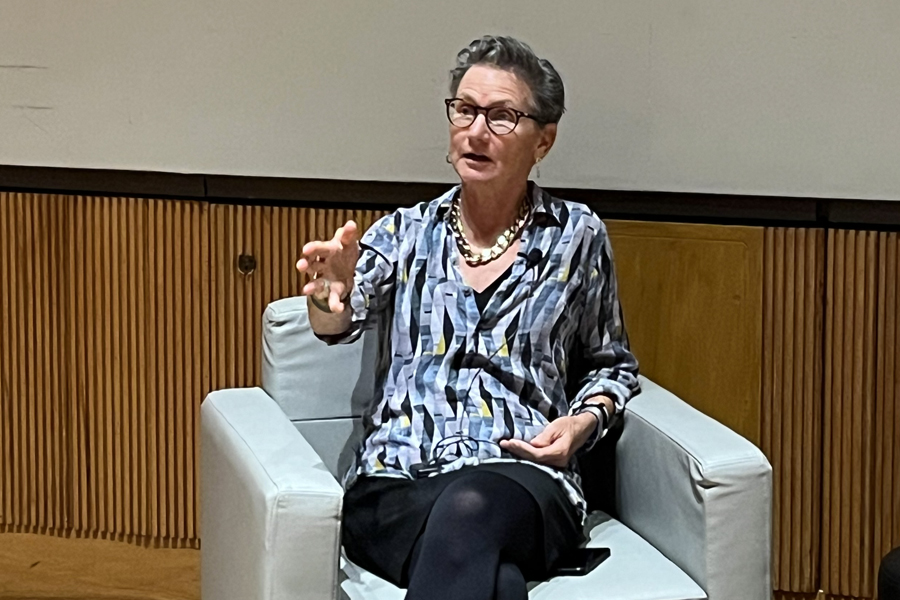
From watching her father perform experiments in the laboratory to working alongside prominent researchers at the National Institutes of Health (NIH), Dr. Annie De Groot’s definition of ‘a physician scientist’ evolved to include entrepreneur. While building her career, she discovered a passion for translational immunology research and founded EpiVax, an immunoinformatics platform company that helps develop findings in the lab into therapeutics for clinical trials.
On Aug. 27, Dr. De Groot recounted her entrepreneurial journey in front of a new cohort of Accelerating BioVenture Innovation (ABI), a program organized by the BioVenture eLab. The next day, she also addressed a public audience in a virtual interview about her company’s technology that predicts immunogenicity (the ability of a substance to elicit an immune response), applications of artificial intelligence (AI) to immunogenicity risk assessments and vaccine design.
After graduating from Smith College, Dr. De Groot attended the Pritzker School of Medicine at the University of Chicago because she liked applying scientific and medical knowledge to solve problems. During medical school, she became interested in the interactions between the immune system and pathogens, which led to a fellowship in the malaria section of the NIH Laboratory of Parasitic Disease. While working at the NIH, Dr. De Groot found that the body’s immune response to malaria vaccines depends on the type of human leukocyte antigens (HLAs) a person has. HLA molecules present proteins from the malaria vaccine to T cells, allowing the immune system to recognize and target the malaria parasite. Since HLAs are genetically determined and diverse in human populations, if a vaccinated person lacks the right HLA molecules, the immune system is less effective at fighting the infection and is potentially more susceptible to severe malaria.
When scientists started using large-scale computers to sequence pathogen genomes, Dr. De Groot felt excited about applying computing power to her research. She worked with Dr. Jay Berzofsky, one of the founders of computational immunology, to detect the parts of the pathogen proteins that were binding to a person’s HLAs, which depends on the sequence of the protein.
Later, at Brown University, her lab built simpler computer programs that used the unique one-letter codes that represent each amino acid in the proten sequence to scan protein sequences for ‘motifs’, or epitopes, (a specific short sequence of amino acids) that could define whether a malaria protein would generate an immune response in an individual or population of people. These early tests of the amino acid motif-finding program were highly accurate and much faster than the laborious, standard laboratory procedures used to find epitopes that would be recognized by T cells.
After she published this work, academic and industry researchers approached Dr. De Groot to help identify T cell epitopes in their proteins. She realized that, with a growing set of outside collaborators, she had an opportunity to establish a company. She spun out a startup from Brown University and applied for NIH/ Small Business Innovation Research (SBIR) grant funding to develop proof- of- concept for her algorithms and to advance her discoveries.
In 1998, Dr. De Groot founded EpiVax, Inc., a technology company that originally focused on using computational immunology approaches to design vaccines. However, investors were still skeptical of new immunotherapies and novel vaccine approaches. As a result, she pivoted, applying her technology to understanding why many monoclonal antibodies and biologics developed at the time were not immunogenic – that is, failed due to lack of immune responses that were observed in clinical trials. Biotech companies were very interested in finding out which of their biologics were immunogenic before launching expensive trials that might fail.
After shifting their focus in the early 2000s, EpiVax rapidly moved away from customized reports to developing an online system that their clients could run on their own for biologics and vaccines. This platform allowed researchers to upload their proteins, run the analyses and predict if a biologic protein would be immunogenic in humans. Now, 13 of the 17 largest companies in the world and many small to medium biotechs use EpiVax’s platform prior to large clinical trials.
“As a company providing customers with access to an immunoinformatics toolkit, we succeeded at innovating continuously. We have developed many new tools for evaluating sequences for immunogenicity and tolerance,” said Dr. De Groot. She has expanded her platform technology to include a tool for predicting whether a vaccine will work against a certain viral strain and one for predicting regulator or suppressor T cell epitopes, which are peptide sequences that may decrease the overall immunogenicity of monoclonal antibodies in the clinic.
Dr. De Groot concluded with advice for future entrepreneurs. She emphasized the importance of integrating AI into the tools to stay ahead of competitors and adapting the business model to opportunities in the marketplace. “I’ve observed that keeping the team small and keeping the conversation going makes it easier to come up with new ideas. We also encourage questions - especially the ones that open holes in previously established doctrine. We’ve found that these questions lead to innovations. That helps us be fearless about science.”
After decades of research, teaching, innovating and managing a company, Dr. De Groot considers herself a different type of physician-scientist – one that makes an impact without wearing a white coat.

